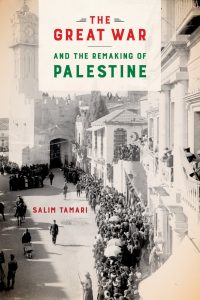Dr. Salim Tamari was born in the city of Jaffa in 1945 and is one of Palestine’s most prominent researchers in the field of historical sociology. Currently appointed as professor of sociology (emeritus) at Birzeit University, Salim is a senior fellow at the Institute for Palestine Studies, editor of the Jerusalem Quarterly, and one of Palestine’s most published scholars. Among his many works are Year of the Locust: A Soldier’s Diary and the Erasure of Palestine’s Ottoman Past (2010), The Mountain Against the Sea (2008), for which Rashid Khalidi, professor of history and contemporary Arab studies at Columbia University, referred to him as “the preeminent Palestinian historical sociologist,” and most recently, The Great War and the Remaking of Palestine (2017).
In The Great War and the Remaking of Palestine, Salim explores Palestine under the Ottoman rule during World War I, highlighting the transformative nature of the conflict in Palestine, and the Ottoman roots of Palestinian and Arab modernity. Most importantly, he tackles the challenges of writing a history in the absence of a national archive, creatively utilizing family papers and archives that were crucial to many of his works. Palestinian scholars, who did not even have a rubric for a state, began to rely on external sources to recount their history: British records, the Israeli archival records, the Ottoman records that have recently become accessible, and less so, the Egyptian records. Palestine Islamic court records, and to a lesser extent church and municipal records, have so far been the main “native” sources for local history. Amidst these intertwined histories, the absence of Palestinian records has posed a problem for Palestinian scholars, which was the incentive for looking at family records and papers as a source to cover this void. This approach began with the development of the oral history project, where survivors from the 1936 rebellion and the 1948 Nakba were invited to provide documentation for these events through experience. Such efforts were later supplemented with researching family papers (diaries, memoirs, photographs, and records of daily life) available at Birzeit University, the Institute for Palestine Studies, and An-Najjah University, which created a very important archival repository. These records allowed for a reading of social history through the biographical lens of family papers, which greatly informed Salim’s work. He notes that once we start examining people’s biographical trajectories, we discover a great deal of variation in types of consciousness, in experiences of war, and in looking back at the texture of the moment, which challenges the retrospective from which national history was generalized.

Salim’s works assert that a main cornerstone of sociology is social history and that we cannot understand the social dynamics of urban life, rural life, or rural transformation without understanding the historical trajectories of people going through these frames. He hopes to continue to utilize this methodology as he explores the Palestine of the 1920s and 1930s due to the importance of recovering that past as the dispossession of Palestinians continues into the present.


